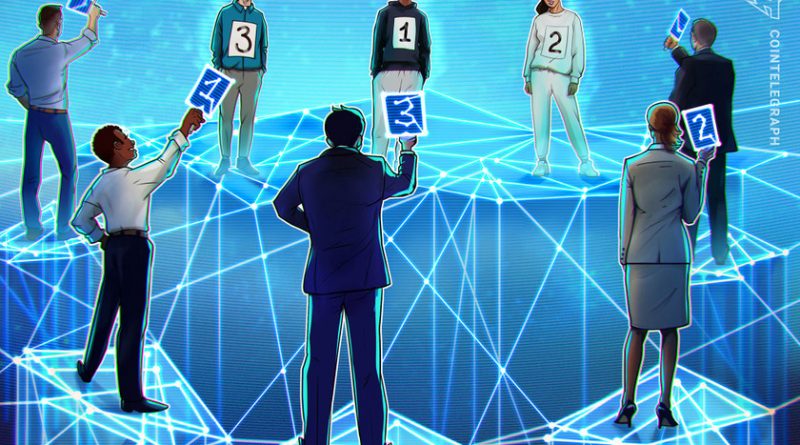Why contests are better than grants for a healthy crypto community
Grant programs have their flaws — they often lack transparency and shut out good ideas. Here’s why contests are a compelling alternative.
What can contests be used for?
Grants are normally reserved for developing infrastructure, apps and other tools, but Free TON says this means other important areas are overlooked.
The network’s mantra is to use contests for everything from validators and software development to marketing and social media strategies.
An added benefit of this approach is how it enables Free TON community members to find something that they’re passionate about — and make a meaningful contribution to making it happen.
Disclaimer. Cointelegraph does not endorse any content or product on this page. While we aim at providing you all important information that we could obtain, readers should do their own research before taking any actions related to the company and carry full responsibility for their decisions, nor this article can be considered as an investment advice.
Are there any projects that use contests instead of grants?
Free TON believes contests are a vital tool in its quest to achieve full, lasting decentralization.
Members of this decentralized community say contests have helped to create a palpable sense of excitement among its thousands of members — and ensure that tokens reach a broader cross-section of people.
In the spirit of transparency, votes are relied on extensively so everyone has a stake in the future direction of the ecosystem. This extends beyond deciding the winner of each contest. The Free TON community is also given the opportunity to have their say on which contests should proceed — and in some cases, who should judge them too.
Soft majority voting is used to allow decisions to be made by the people who care most, rather than forcing neutral or uninterested parties to cast a ballot.
How do contests help to make a crypto community healthier?
Supporters believe that they help bring a community together — boosting engagement and drawing in new users.
For the winners of contests, the benefits extend far beyond monetary gain. As a network grows in size, they can see their contributions come to life — and take satisfaction in knowing that their handiwork has helped make the blockchain what it is today.
Giving everyone a chance to have their say can eliminate the groupthink that holds a promising project back, and generate a legion of active contributors instead of passive users who are disenfranchised because they feel like they don’t have a voice.
They can also enable innovation to happen much faster — with contests enabling smaller batches of tokens to be distributed to winners far more quickly. This is a stark contrast to grants, where it can take months for disbursements to be given the green light.
Why are contests a better alternative?
Advocates argue that contests ensure token distribution is done meritocratically.
If grants are money for promises, contests can be typified as rewards for contributions — and supporters claim that, in the long run, they deliver far better results than grants.
Contests create a competitive environment where anyone in a community can throw their hat into the ring, and fellow members can vote for the projects and ideas that they like best. They can also spark a discussion that enhances the end product. A contest to build a new website might unlock lively debate about other powerful ideas to raise awareness — triggering further contests so these concepts can be brought to life, too.
Another powerful point lies in how these contests can be open to everyone — irrespective of where they live, what their background is, or who their contacts are. This approach has been dubbed “the great leveler” — ensuring that decentralized projects stay that way.
What are the downsides of crypto grants?
Grants don’t always involve members of the community — and in some cases, the process can be rather opaque.
In an article a few months ago, Lane Rettig said: “I have yet to see a well-run grants program in the blockchain space.”
Given how extensively grants are used across the industry, this is a rather damning indictment. Rettig argued that these schemes tend to be incredibly centralized. Not only does an organization end up setting the agenda for development, but in many cases, founders end up giving large grants to people they already know. He pointed to the Ethereum Foundation as an example, noting: “Some of the largest grants have been awarded to projects led by individuals who are close friends of Vitalik Buterin.”
Grants struggle to deliver “permissionless innovation,” Rettig said, which he described as “the superpower of blockchain.” This is what enables a teenager to start mining crypto from their laptop at home, without needing a credit card or to go through Know Your Customer checks.
Ultimately, the main risk associated with grants is that they can be offputting to people who have bright ideas but are daunted by filling out an application form. Cutting-edge concepts can end up being shut out and disregarded because they don’t fit into the rigid parameters of a grant program. Allegations of nepotism and unfairness can begin swirling around — and worse still, community members may feel that they don’t have a say in the future direction of the ecosystem.
What are crypto grants for?
Some of the world’s biggest blockchain foundations and companies offer grants to developers in order to help them expand.
In a nutshell, you could characterize grants as a form of free money. They are awarded to people who can build cutting-edge solutions that help projects expand — whether this is in the form of educating the public, making a network more secure, enhancing a blockchain’s core infrastructure, or enabling it to process a greater number of transactions per second.
Depending on the organization dishing out the grants, tens of thousands of dollars can be at stake. Recipients normally have to apply in order to unlock funds, and this process is usually rather time consuming. Strict eligibility criteria can also be in force, meaning a committee may be tasked with making decisions about a platform’s future direction.




